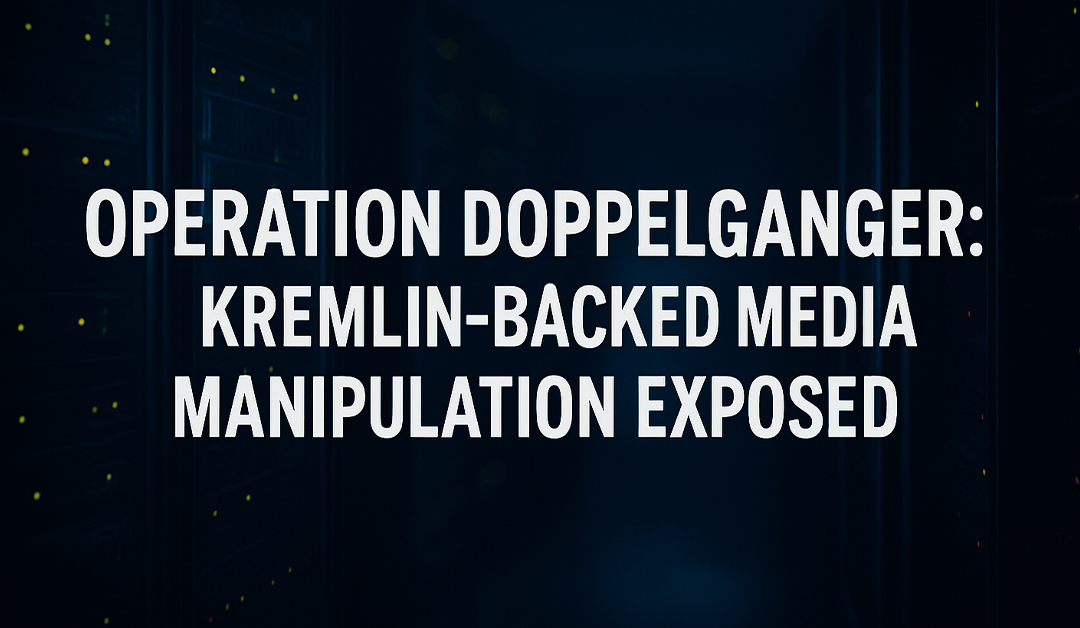In a sprawling affidavit spanning over 270 pages, U.S. federal investigators have revealed the mechanics of "Operation Doppelganger" - a state-directed Russian propaganda campaign orchestrated through fake news websites and AI-generated social content, all aimed at disrupting elections and shaping global perception.
Using nearly identical replicas of trusted news sites like The Washington Post and Fox News, Russian government-backed operatives published disinformation designed to weaken U.S. support for Ukraine, amplify social division, and even influence the 2024 U.S. presidential election.
"They are expecting fake news from us every day," one internal note reads.
🎭 The Spoofed Domains and The "News" That Wasn’t
The campaign relied on 32 "cybersquatted" domains - fraudulent clones that mimicked legitimate outlets in appearance, layout, and even bylines, frequently attributing false stories to real journalists.
These domains were:
-
Purchased through U.S.-based registrars
-
Populated with pro-Kremlin propaganda
-
Promoted using fake American social media accounts and paid AI-driven ads
One fake article on the spoofed Washington Post site read:
"It is time for our leaders to recognize that continued support for Ukraine is a mistake… The Biden administration should just make a peace agreement and move on."
The stories often used manipulative narratives like "The U.S. is behind everything" or depicted Ukrainian leaders as corrupt aggressors - all while routing links back to legitimate sites to appear credible.
🤖 AI, Bots, and "Perishable" Social Accounts
The operation didn’t stop at fake websites.
Spearheaded by Russian PR firm SDA and tech group STRUCTURA - under the direct guidance of senior Putin aide Sergei Kiriyenko - the campaign involved:
-
60+ fake websites across Europe and North America
-
160+ Facebook pages
-
Thousands of fake "influencer" profiles designed to appear American
-
Comments seeded across Twitter, Facebook, and Truth Social
-
Paid ads created using AI tools, targeting swing states with polarizing content
One internal plan dubbed "The Good Old U.S.A." aimed to convince Americans that money spent on Ukraine should instead go to domestic problems - echoing divisive talking points across political lines.
"The psychological response team will use bots to moderate top discussions," a planning document read, "adjusting further launches depending on which group was affected the most."
🔒 Legal and Sanctions Fallout
The U.S. government has now seized the 32 domains tied to Operation Doppelganger under multiple statutes:
-
International Promotional Money Laundering
-
Trafficking in Counterfeit Goods and Services
-
IEEPA Violations (Economic Sanctions)
The domains were traced to payments routed through U.S. registrars by Russian nationals and companies already sanctioned by OFAC - including SDA, STRUCTURA, and individuals like Ilya Gambashidze and Nikolai Tupikin.
"The appearance of these domains is identical to the real outlets," wrote FBI Special Agent in the affidavit. "They are designed to confuse and deceive."
📊 Election Meddling in Real Time
The campaign’s scope goes far beyond past Russian interference:
-
Thousands of comments per month were planted targeting French, German, and American audiences.
-
Swing states like Arizona, Georgia, and Wisconsin were specifically flagged for focus.
-
U.S.-based influencers - real and fake - were identified and tracked in massive databases.
-
Content was tailored for specific racial, political, or religious groups - sometimes using expat communities in Mexico or Israel as conduits to influence the U.S. electorate.
In one note, the operatives outlined their goal:
"Escalate internal tensions in the countries allied with the United States… to destabilize the societal situation."
🧩 The Bigger Picture: Cyber Espionage Meets Disinformation
With links stretching back to 2022, the effort wasn’t just about Ukraine.
Campaigns were mapped to upcoming European elections, domestic unrest in NATO countries, and even covert support for Putin’s own re-election campaign. Documents detail "media clusters" - up to 50 sites per country - designed to mirror trusted brands but push Kremlin-approved storylines.
"From a German to a German… from a Frenchman to a Frenchman," one memo said. "That’s the tone we use."
Other memos described bypassing sanctions, crafting "false but emotionally resonant" stories, and deploying influencers via wine-and-dine offers.
🧵 The Takeaway
This is not just about fake news.
Operation Doppelganger reveals a deep and calculated use of the internet’s infrastructure as a tool of psychological and geopolitical warfare - with the aim of rewriting public perception, sowing distrust in media, and eroding democratic consensus.
The campaign’s exposure offers a rare and disturbing window into how modern hybrid warfare unfolds not on battlefields, but in browsers and comment threads.
"This wasn’t a rogue op," said one analyst. "This was the Russian state weaponizing the American internet against its own people."






